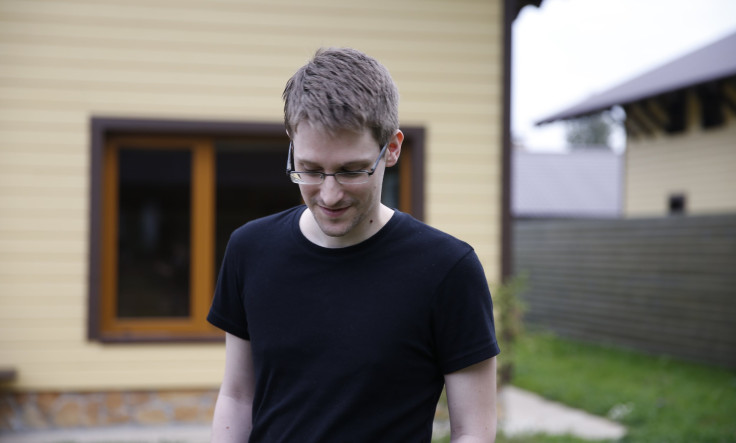Snowden Documentary 'Citizenfour' Premieres To Wide Praise, But Raises Questions

Updated Oct. 13, 6:30 a.m. ET
“Citizenfour,” Laura Poitras’ documentary about Edward Snowden’s exposure of the National Security Agency's civilian surveillance tactics, had been widely hailed by critics and is already generating Oscar buzz following its premiere this weekend at the New York Film Festival. But the omission of key details has prompted more measured praise, most notably from Michael Kelley of Business Insider, who characterized the film as “critically flawed.”
“Unfortunately, the film, while revealing details about Snowden's time in Hong Kong [and Moscow], does little to answer fundamental questions regarding the former NSA systems administrator's alleged theft of more than a million NSA documents,” Kelley wrote. “What is not mentioned in ‘Citizenfour’ is that beyond the estimated 200,000 documents given to Poitras and [then-Guardian journalist Glenn] Greenwald, Snowden also took up to 1.5 million documents detailing NSA operations targeting American adversaries.”
Snowden reportedly shared information about these additional documents with the South China Morning Post in June 2013. In August, Kelley wrote these “tier 3” documents “potentially detail[ed] U.S. capabilities and NSA offensive cyberoperations,” including surveillance in China, adding, “a close reading of relevant reporting and of statements made by Snowden suggests that much of what the rogue NSA employee intentionally took involved operational information unrelated to civil liberties.”
As the contents of these additional documents have not been confirmed, it’s difficult to conclude the filmmakers behind “Citizenfour” omitted a discussion of them to skew the public’s perception of Snowden’s intent and the degree to which his leaks may have threatened domestic security. But, as Kelley points out, the documentary also leaves out criticism of Snowden by William Binney, a former NSA agent-turned-whistleblower who is featured prominently in the film. In “Citizenfour,” Binney offers only praise of Snowden, calling him a “patriot.” But in June 2013, Binney told USA Today Snowden had gone “a little beyond public service” in revealing potentially sensitive intelligence operations to the South China Morning Post. “He is transitioning from whistleblower to traitor,” Binney told USA Today.
“Citizenfour” also omits a detail about Snowden’s work with the NSA that could be relevant to helping understand his intentions. As International Business Times previously reported, Snowden told the South China Morning Post June 12, 2013, he had taken a job at NSA contractor Booz Allen in March 2013 explicitly for the purpose of collecting evidence of the NSA’s domestic surveillance operations. In an interview with Salon two days earlier, Poitras dismissed the implication Snowden had taken the Booz Allen job with the intention of leaking documents as “absurd.” If Snowden began working for Booz Allen when he said he did, that means he would have been in touch with both Poitras and Glenn Greenwald before taking the position. In the Salon interview, Poitras said she had no idea where he was working before she received the leaked documents.
One of the film’s most talked-about reveals is that Snowden’s girlfriend Lindsay Mills is now living with him in Moscow. Russia granted Snowden a three-year residence permit in August. The disclosure was made at the end of the film as the couple is seen making dinner through a window of residence somewhere in Moscow. In earlier scenes in “Citzenfour” Snowden is seen in his Hong Kong hotel room communicating with Mills on his laptop in what appears to be an online chat correspondence -- Snowden can be seen typing and reacting to messages he receives, but his computer screen is not shown. Also in the film, Snowden tells Poitras (who is never seen on camera, as she is presumably filming) and Greenwald that Mills was not aware of his plans before he left Hawaii, where they lived together, to meet the journalists in Hong Kong. He expresses concern about her safety and says he suspects their home is under surveillance. It is unclear whether Snowden and Mills were communicating via an encrypted connection: By that point, Snowden did not appear to be worried about his own detection.
Greenwald questioned, at least momentarily, the wisdom of Snowden coming forward so soon. He argued that it would be doing the government's "job for them," instead suggesting that they wait and see if the authorities could track him down on their own. While Snowden says in the film that he will cooperate with whatever the journalists believe is the right decision, he appeared resolute in outing himself, albeit insisting that he didn't want to be the focus of the story -- which is not quite how it turned out.
In another hotel room scene, a bell-like sound is heard while the trio, along with another Guardian journalist, is gathered. Snowden immediately declares that the sound is the hotel fire alarm, and he and Greenwald semi-joke about the possibility the alarm is being rung to get Snowden and the journalists out of the hotel room and potentially into the hands of authorities. At one point, Greenwald asks Snowden if he’s heard the same alarm before, and Snowden says no, but does not elaborate on how he was sure it was a fire alarm if he hadn’t heard it previously. A call to the front desk confirms the alarm, which is heard repeatedly in the scene, was a test.
But the subject about which audiences are most eager to learn is the existence of another leaker. In the final scene of “Citzenfour,” Greenwald reveals to Snowden in a written note (which cannot be seen) the name of a second source who is believed to be actively leaking intelligence data. In the scene, Snowden appears to be shocked by the identity of the alleged leaker, and the film closes on a shot of the word “POTUS” written on sheet of paper, suggesting that this source is working inside the White House.
“Citizenfour” will be released theatrically on Oct. 24.
© Copyright IBTimes 2024. All rights reserved.












